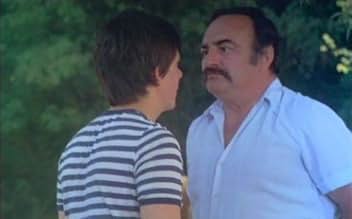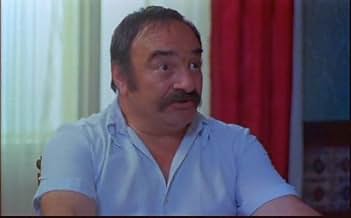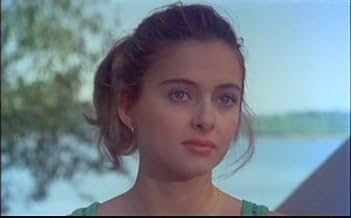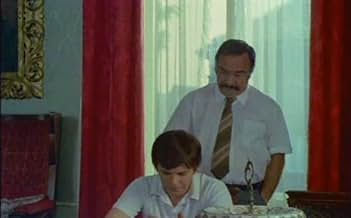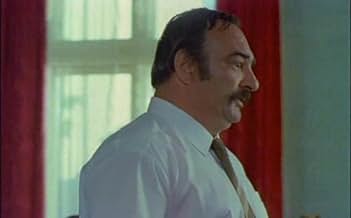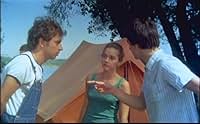IMDb RATING
8.4/10
6.5K
YOUR RATING
For the young man who lives in Serbian province town, the maturing coincides with the turbulent political events of the year 1968.For the young man who lives in Serbian province town, the maturing coincides with the turbulent political events of the year 1968.For the young man who lives in Serbian province town, the maturing coincides with the turbulent political events of the year 1968.
- Director
- Writers
- Stars
Sanja Vejnovic
- Ruzenjka Hrabalova
- (as Sanja Vejinovic)
- Director
- Writers
- All cast & crew
- Production, box office & more at IMDbPro
Featured reviews
This movie has a cult status in former Yugoslavia for no reason whatsoever. It's just one of many unsuccessful movies done by so-called Prague school directors ( Paskaljevic, Grlic, Karanovic) that were out of touch with modern cinema and the world itself.
10ereinion
This movie will always stay in my memory as one of the funniest and best comedies I ever saw back in former Yugoslavia. It centers around the eldest son (Stimac) of a family led by a strict authoritarian father in Danilo Bata Stojkovic's magnificent incarnation. The young Petar struggles to graduate from high school mainly for one reason-he is so infatuated with his Marxism teacher that he cannot think of anything else but her during the classes. So when the graduation time comes, he lies to his father about passing in all the subjects while in reality flunking in Marxism.
Of course, the truth is not easy to hide and when it eventually comes out, his father is appalled and decides to punish him and lead his mind off from girls by finding a job for him in a local bakery. But that becomes complicated too when it turns out a beautiful and voluptuous girl is working there and she is an easy catch as well! Complications and comical twists just keep coming and coming here and the laughter never ceases.
All this is going on during a very turbulent time, the '68 student revolution. My favorite scene is when Stojkovic throws out the TV because of the student uprising claiming it's immoral to watch it and then when Tito approves of the reforms he brings it back saying "Comrade Tito has said that the students are right. We can watch television again!" Paskaljevic was a master of socio comedy and all the actors do a great job. The ending is specially great and this is probably Slavko Stimac's best role.
Of course, the truth is not easy to hide and when it eventually comes out, his father is appalled and decides to punish him and lead his mind off from girls by finding a job for him in a local bakery. But that becomes complicated too when it turns out a beautiful and voluptuous girl is working there and she is an easy catch as well! Complications and comical twists just keep coming and coming here and the laughter never ceases.
All this is going on during a very turbulent time, the '68 student revolution. My favorite scene is when Stojkovic throws out the TV because of the student uprising claiming it's immoral to watch it and then when Tito approves of the reforms he brings it back saying "Comrade Tito has said that the students are right. We can watch television again!" Paskaljevic was a master of socio comedy and all the actors do a great job. The ending is specially great and this is probably Slavko Stimac's best role.
This whole film is basically a series of episodes where a horny youngster chases women. It is presented as a kind of coming of age story, but it's just a minimalist script with episodic structure. There are funny moments in it, but on the whole it's a rather empty experience. It is particularly problematic because it is ostensibly a family film, while in reality watching countless scenes with erotic content is likely to make a family viewing of the film a nightmare. Totally overrated film, and quite annoying at times. An irritating protagonist, too. I guess most people like it because of the iconic bakery scene, involving some hefty breast squeezing action.
Following the Summer of Love in 1967, 1968 was vastly different. The assassinations of Martin Luther King Jr and Bobby Kennedy, the student uprising in Paris, the protest at the Democratic National Convention in Chicago, the Soviet invasion of Czechoslovakia, the massacre of protesters in Mexico City right before the Olympics got held there, all culminating in Nixon's election.
Goran Paskaljević's "Varljivo leto '68" ("The Elusive Summer of '68" in English) indirectly looks at this. The protagonist is Petar, a teenage boy in Yugoslavia. His dad, while a Marxist, is nonetheless the type who thinks that the younger generation doesn't appreciate what the parents' generation did (sort of an Archie Bunker in that sense). Petar is flunking Marxism in school, due to his interest in women. This ranges from his teacher, to a young woman in a bakery (resulting in the movie's best scene). But this is all amid the turbulent events that took place that summer. Early in the movie the family sees the Paris uprising on the news, and towards the end there's news that the Warsaw Pact armies have entered Prague.
I'd say that this story could've taken place in almost any country. It's well known that the '60s were all about sexual awakening and protests, much of it scorned by the parents' generation. Indeed, the movie shows some of the protests that took place in Yugoslavia. We even hear "The Blue Danube" played while the family is on the beach (I wonder if this was a reference to "2001: A Space Odyssey").
Anyway, it's not a masterpiece, but still worth seeing. I don't know how widely available it is; I saw it online.
Goran Paskaljević's "Varljivo leto '68" ("The Elusive Summer of '68" in English) indirectly looks at this. The protagonist is Petar, a teenage boy in Yugoslavia. His dad, while a Marxist, is nonetheless the type who thinks that the younger generation doesn't appreciate what the parents' generation did (sort of an Archie Bunker in that sense). Petar is flunking Marxism in school, due to his interest in women. This ranges from his teacher, to a young woman in a bakery (resulting in the movie's best scene). But this is all amid the turbulent events that took place that summer. Early in the movie the family sees the Paris uprising on the news, and towards the end there's news that the Warsaw Pact armies have entered Prague.
I'd say that this story could've taken place in almost any country. It's well known that the '60s were all about sexual awakening and protests, much of it scorned by the parents' generation. Indeed, the movie shows some of the protests that took place in Yugoslavia. We even hear "The Blue Danube" played while the family is on the beach (I wonder if this was a reference to "2001: A Space Odyssey").
Anyway, it's not a masterpiece, but still worth seeing. I don't know how widely available it is; I saw it online.
A communist romantic comedy who proves again in communism there's no such a thing as censorship. Whose who say there was censorship in communism are brainwashed by capitalistt propaganda.
Did you know
- TriviaAs of 2016 it was included in the #100 Serbian movies list (1911-1999) and protected as cultural heritage of great importance.
- ConnectionsReferences Un été 42 (1971)
- How long is The Elusive Summer of '68?Powered by Alexa
Details
- Release date
- Country of origin
- Languages
- Also known as
- The Elusive Summer of '68
- Filming locations
- Sremski karlovci, Serbia(on location)
- Production company
- See more company credits at IMDbPro
Contribute to this page
Suggest an edit or add missing content


